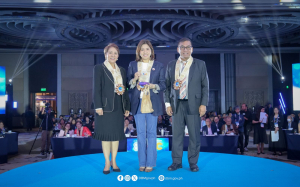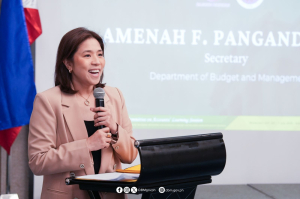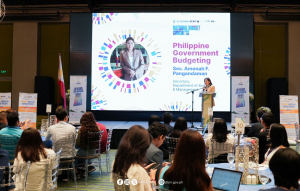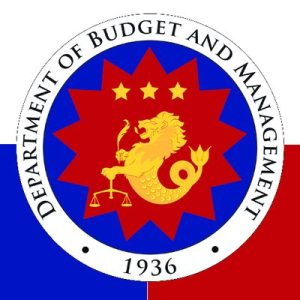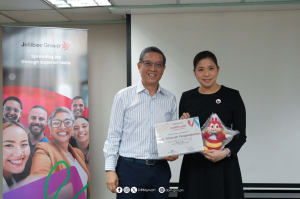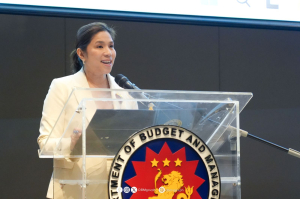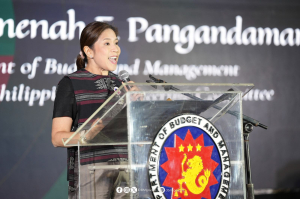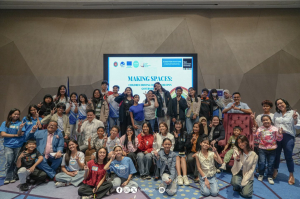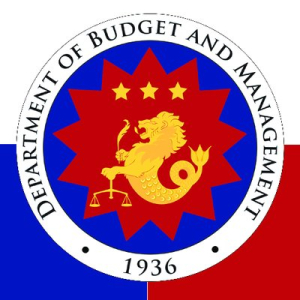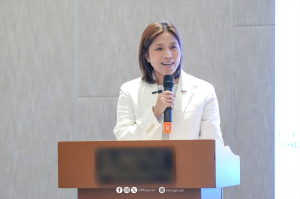
- Details

Minister Mohagher Iqbal, members of the Intergovernmental Relations Body (IGRB), ladies and gentlemen, Assalamu alaikum.
For this 13th Intergovernmental Relations Body (IGRB) Meeting, we hope to have the same successful discussions as the previous ones where we made key decisions to ensure the delivery of quality public service to our citizens in the Bangsamoro Autonomous Region in Muslim Mindanao (BARMM).
As always, I am honored to co-chair with Minister Iqbal and have our esteemed executives from the National and Bangsamoro governments in full force to strengthen our efforts in setting the path for BARMM’s continuous development in social, economic, and cultural aspects.
Looking back, I am happy to note that we had a successful Inaugural Meeting of the IGRB in October and a fruitful engagement with legislative counterparts at the Inaugural Meeting of the Philippine Congress-Bangsamoro Parliament Forum (PCBPF). Just recently, the Senate members of the PCBPF were named: Senate President Pro Tempore Loren Legarda as chairperson, and Senators Joseph Victor Ejercito, Francis Tolentino, Robinhood Padilla, and Aquilino Pimentel III as members. On the other hand, their counterparts in the House of Representatives will be determined next week.
Last December, the IGRB held its 12th meeting—and its first under the Marcos Jr. Administration—to discuss the mechanisms in ensuring that BARMM will be integrated into the country’s national development agenda. This was followed by the Intergovernmental Fiscal Policy Board (IFPB) meeting co-chaired by Finance Secretary Benjamin Diokno and BARMM Minister for Finance, Budget and Management Atty. Ubaida Pacasem. The IFPB discussed among others, the digitalization of BARMM’s tax system, and committed to ensure that BARMM’s financial needs are met.
These were just the start of a harmonious working relationship that has already resulted in many accomplishments.
In the past six months, the various technical working groups (TWGs) have started discussions regarding their respective agenda. Among the resolved issues are the conduct of the annual Hajj and Umrah and the very recent positive directive of the National Government regarding the nationwide recognition of Bangsamoro Land Transportation Office (BLTO) driver’s licenses and registration renewals.
And true to our vision of a BARMM that is thriving and a Mindanao that shines as a land of promise, we now have the Oversight Committee on Marawi Siege Victims Compensation Act, pursuant to R. A. No. 11696. The Committee is composed of members from the House of Representatives namely, Cong. Yasser Balindong, Munir Arbison Jr., Sittie Aminah Dimaporo, Mujiv Hataman, and Paul Daza; and the Senate chaired by Sen. Ronald “Bato” Dela Rosa, with Senators Juan Edgardo Angara, Robinhood Padilla, Aquilino Pimentel III, and Risa Hontiveros as members. As you may know, the rehabilitation and recovery of Marawi City is a project that is close to my heart as a fellow Maranaoan.
When it comes to the transfer of properties from the National government to the Bangsamoro government, various agencies have already given updates and committed their respective timelines. In fact, just this week, we received news about the Ceremonial Turnover of the LTO Maguindanao and Marawi City District Offices to BARMM.
Last week, we also joined the Consultation on BARMM Digital Transformation of Government-Public Financial Transactions and expressed our full support for their digitalization initiatives. As I have emphasized, collaborating with BARMM in their digital transformation journey is our way of helping in their mission to uplift the lives of the Bangsamoro.
With these achievements in only six-months time, I know that we will soon see a more united Philippines where no Filipino is left behind, not even those in the farthest areas of BARMM.
There is still much work to do ahead. But I hope that with these achievements in just a few months time, we are all inspired to continue working hard towards our Agenda for Prosperity in BARMM.
Now, let me take this opportunity to thank the Bangsamoro Parliament for the time, effort, and dedication that you have been giving in our collaborations. Together, we will harness nation-building with integrity and care for our people.
Today, we are all set to create new paths. As we widen our horizons—for BARMM, Mindanao, and the country—I pray that our meetings and discussions will continue to result in decisions that will help make peace and prosperity a reality for all of our people.
Maraming salamat po.
Mabuhay ang BARMM! Mabuhay ang Pilipinas at mga Pilipino!
Assalamu alaikum.
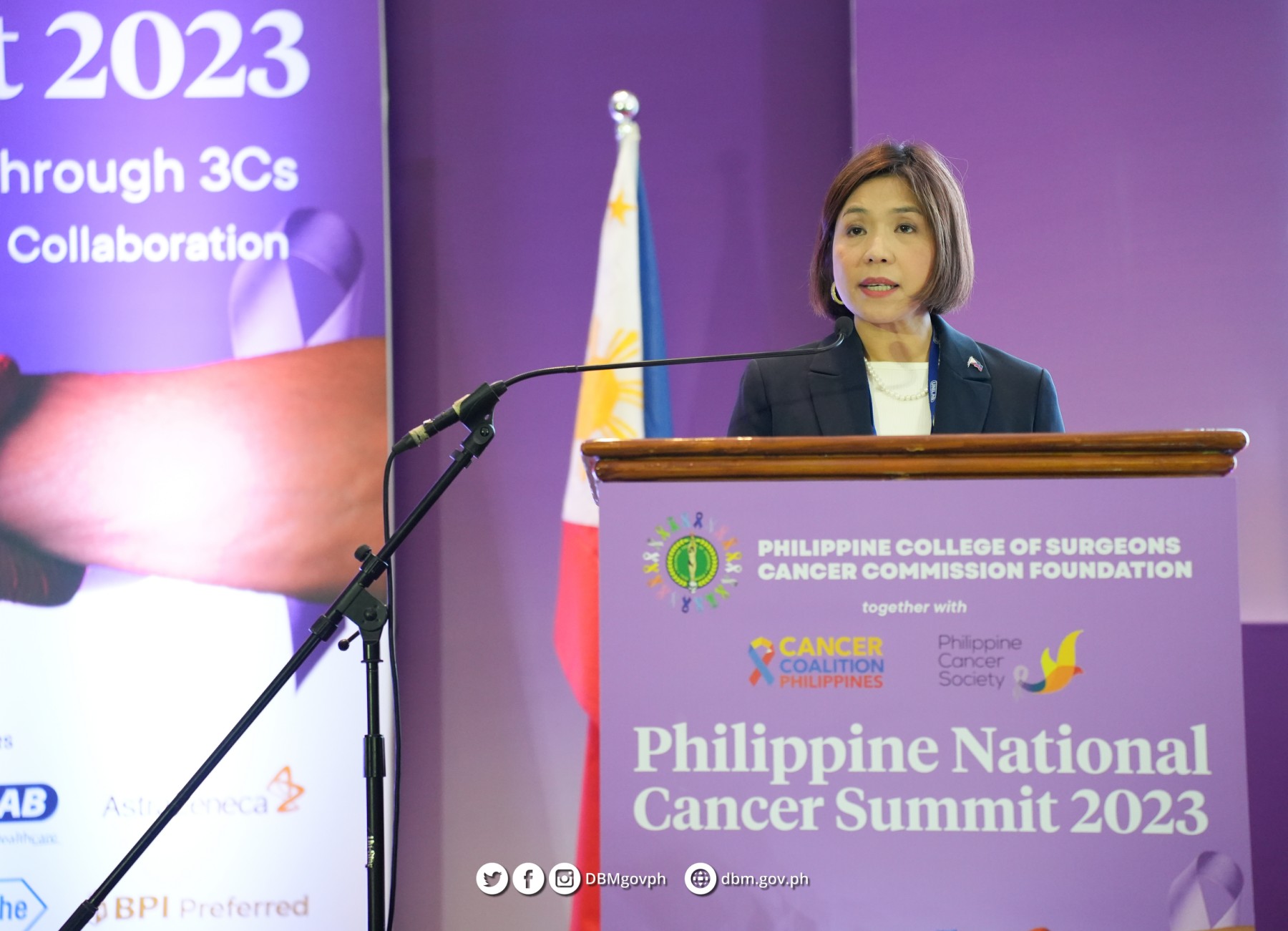
- Details

Good day, everyone.
First, I would like to thank the Philippine College of Surgeons Cancer Commission Foundation and the Cancer Coalition Philippines for having me today.
It is an honor to be part of an event that provides an avenue to put oncology financing in the spotlight amid the myriad challenges that our national health system is facing.
I would also like to extend my sincerest appreciation to our health advocates and champions who have been continuously pushing for quality healthcare for Filipinos, especially our cancer patients.
For many years, cancer has been one of the leading causes of death in the country. And as you may know, many Filipino families, even those in the upper income brackets, are vulnerable to catastrophic health spending due to high treatment costs and limited coverage of cancer care under public programs. Based on 2019 estimates, around 60 percent of the total public cancer expenditures comes from out-of-pocket payments and private insurance.
As such, we should discuss public oncology financing through the advancement of the implementation of the National Integrated Cancer Control Act or NICCA with sustainability in mind. Through this, we can provide our fellow Filipinos quality and affordable cancer-related healthcare that would last for many generations.
Passed into law in 2019, the NICCA mandates the creation of the National Integrated Cancer Control Program, the Philippine Cancer Center, the Cancer Assistance Fund, and the National Integrated Cancer Control Council, as well as the expansion of the benefit packages of PhilHealth for cancer-related tests and treatments.
I am very proud to share with all of you that we have already established all these, including sustainable financing mechanisms such as public-private partnerships and tax reforms—keeping the legislation's promise of hope for cancer patients, survivors, and their families.
With the new administration comes renewed and better hope for the health sector in general, as President Ferdinand Marcos Jr. puts a premium on boosting the health of Filipinos and strengthening the capacity of our healthcare system. We can see this from the Php 327.2 billion budget allocation for the Health sector which represents a 17 percent increase from its 2022 level.
Under this budget, we have allocated Php 1.06 billion for the National Integrated Cancer Control Program (NICCP) to provide funding and support for cancer control activities; increase public awareness about cancer, its causes, and its prevention; and promote healthy lifestyles to reduce the risk of developing cancer.
Meanwhile, some Php 500 million is allotted for the Cancer Assistance Fund (CAF) which shall complement existing financial support mechanisms like the PhilHealth coverage and Malasakit funds to address increasing cancer requirements.
Further, Php 100.2 billion is allocated for the National Health Insurance Program (NHIP) in which Php 21.17 billion, or more than 21 percent, will be used for the enhancement of the PhilHealth Z benefit packages.
Supplementing this is Php 32.63 billion for Medical Assistance to Indigent and Financially-Incapacitated Patients needing consultation, rehabilitation, and examination in government hospitals.
Acknowledging the importance of health infrastructure and technology in giving our fellow Filipinos quality healthcare, some Php 26.81 billion will be used for the Health Enhancement Facilities Program which will fund capital expenditures such as Magnetic Resonance Imaging (MRI) and Positron Emission Tomography-Computed Tomography (PET-CT) used for cancer diagnosis.
Just this month, the National Economic and Development Authority (NEDA) Board chaired by the President also approved the Php 6 billion UP-PGH Cancer Center which will house 300 beds, providing a bigger facility with better technologies for cancer patients.
The UP-PGH Cancer Center is the first Public-Private Partnership project under the Marcos Jr. administration, attesting to its commitment to prioritizing healthcare. The President further hopes to mirror this project with the creation of regional specialty hospitals nationwide.
Vital to the provision of quality healthcare is ensuring that our health workers receive adequate government support as well. Thus, we have allocated some Php 16.95 billion for the implementation of the National Health Workforce Support System.
In addition, the Philippine government has proactively implemented measures for cancer prevention, as cancer studies show that prevention is still better than cure. These include vaccination against cancer-causing pathogens such as HPV and Hepatitis B, as well as earmarking revenues collected from taxes on tobacco and alcohol products.
Further, some Php 29.12 billion will be used for the procurement of drugs, medicines, and vaccines for distribution to government health care facilities. Of which, eighty percent, or Php 23.30 billion, will go to provinces, in line with the administration's goal of providing accessible and inclusive healthcare for all Filipinos.
Moreover, an estimate of Php 313.24 billion generated from the Sin Tax Reform will be used to sustainably fund initiatives for universal healthcare. More than its economic benefit, the Sin Tax Reform was reported to have resulted in 6 million less smokers in 2022, equivalent to 60,000 lives saved, proving its effectiveness as a protective health policy reform.
However, these measures and strategies only function when social and economic conditions, infrastructure, and the public health and medical systems work in synergy.
As such, we have established the said sustainable financing mechanisms and taken significant steps towards the advancement of the implementation of the NICC Act. Yet we have a long way to go and a longer list of things to hope for such as better funding for cancer research and development in the country; possibly a National Research and Development Program for Cancer Control; and more facilities and better technologies for screening, early detection, diagnosis, control, and care.
For this reason, it is imperative that members of different sectors—public, private, academic and research institutions, non-governmental, and civil society organizations engage in today’s event. Your commitment to the cause and active community participation will be our key to realizing these aspirations.
And so we continue to hope that we may one day soon have a future that is cancer-free. And seeing all the initiatives and actions being taken towards this makes me believe that it is possible.
Rest assured that the Department of Budget and Management is one with you in realizing our aspirations for a cancer-free Philippines. NEVER LOSE HOPE. Let us all be allies in giving our fellow Filipinos hope and courage—a fighting chance—to avoid and beat cancer.
Para sa malusog, inklusibo, at masaganang Pilipinas, mabuhay po tayong lahat! Maraming salamat po. Assalamu alaikum.

- Details

Good evening to all the university administrators, professors and instructors, personnel, students, and fellow alumni receiving their awards today.
Coming back here invokes so much nostalgia. Morayta looked so different. Though it was already crowded back then, the Far Eastern University was always beautiful in its own way. And though the beauty it possesses now—with this auditorium, upgraded facilities, and more buildings—is different, the sound of “Let’s go, Tamaraws!” still rings loudly in these halls.
Aside from the sentimentality of being here again in FEU and the familiar rush of school spirit, I honestly feel so grateful for the values that FEU has instilled in me—hard work, integrity, and most importantly, the passion to serve our people and our nation. Hindi hamak na mas bata tayo noon, pero bitbit pa rin natin ang mga alaala at aral hanggang ngayon. And decades later, we are here receiving awards—and it is my honor to accept this on behalf of all the excellent awardees for this year.
In the invitation, it is stated that we were chosen because we have brought prestige to our alma mater and have contributed to the advancement of society. As a college student, I never thought that one day, FEU would recognize me for being the Secretary of the Department of Budget and Management.
Being here today, I feel I’ve come full circle because this is where I gained my foundation in economics and honed my leadership skills which has been essential in my journey as a public servant. It prepared me for my work at the Senate, at the Bangko Sentral ng Pilipinas, and now, at the Budget Department.
And when I am with our country’s economic leaders, as well as investors and economic leaders from the International Monetary Fund, the World Bank, and other global institutions, I know that I carry the experiences and lessons I gained from these halls.
Now, I am standing before my mentors and all of you equally accomplished alumni, and I know that we would not be here without the values that FEU inculcated in all of us as college students—fortitude, excellence, and uprightness—which I’m sure you’ve all taken to heart and carried with you in your respective fields, as I have and do now as a public servant.
Now, with the great honor that this award brings, I want to encourage my fellow awardees to contemplate: What more can we do? What is our telos or purpose for doing what we do? In pondering upon questions such as these, I hope we become more fueled to excel in our callings.
At this juncture, on behalf of my fellow awardees, I would like to express my deepest gratitude to the Far Eastern University for this recognition. Thank you to all our professors and mentors who taught us that we must let go of comfort and convenience in order to grow and serve others. Thank you to the maintenance and security personnel, and other staff who made sure that we studied in classrooms that are conducive to learning, and ensured our safety inside and outside the university. Bahagi po kayong lahat ng aming narating at maaaring marating pa. The institution and the students would never be here without every individual who gave their time, skill, and strength, and contributed in their own way for our betterment.
To my fellow awardees, may we continue living up to the honor that the Green and Gold Awards bestowed upon us: let us instill hope and be the gold standard of service to the people and our nation. Let us work together to inspire the next generation to be brave and future-ready like a true FEU Tamaraw.
And to the students today of FEU, the hope of tomorrow and our future leaders, may you grow in the FEU Tamaraw spirit of bravery, courage, intelligence, and strength as we alumni have, and serve our nation in a way that will make both our mentors— those who forged the path before us—and the future generations proud.
Thank you to everyone who made and makes our beloved alma mater the exemplary higher institution that it is today. We will always be grateful for the tutelage, wisdom, and experiences that we still, and will always, carry with us.
To my fellow alumni, more power. Onward FEU, onward Philippines!
Mabuhay po kayo. Assalamu alaikum.
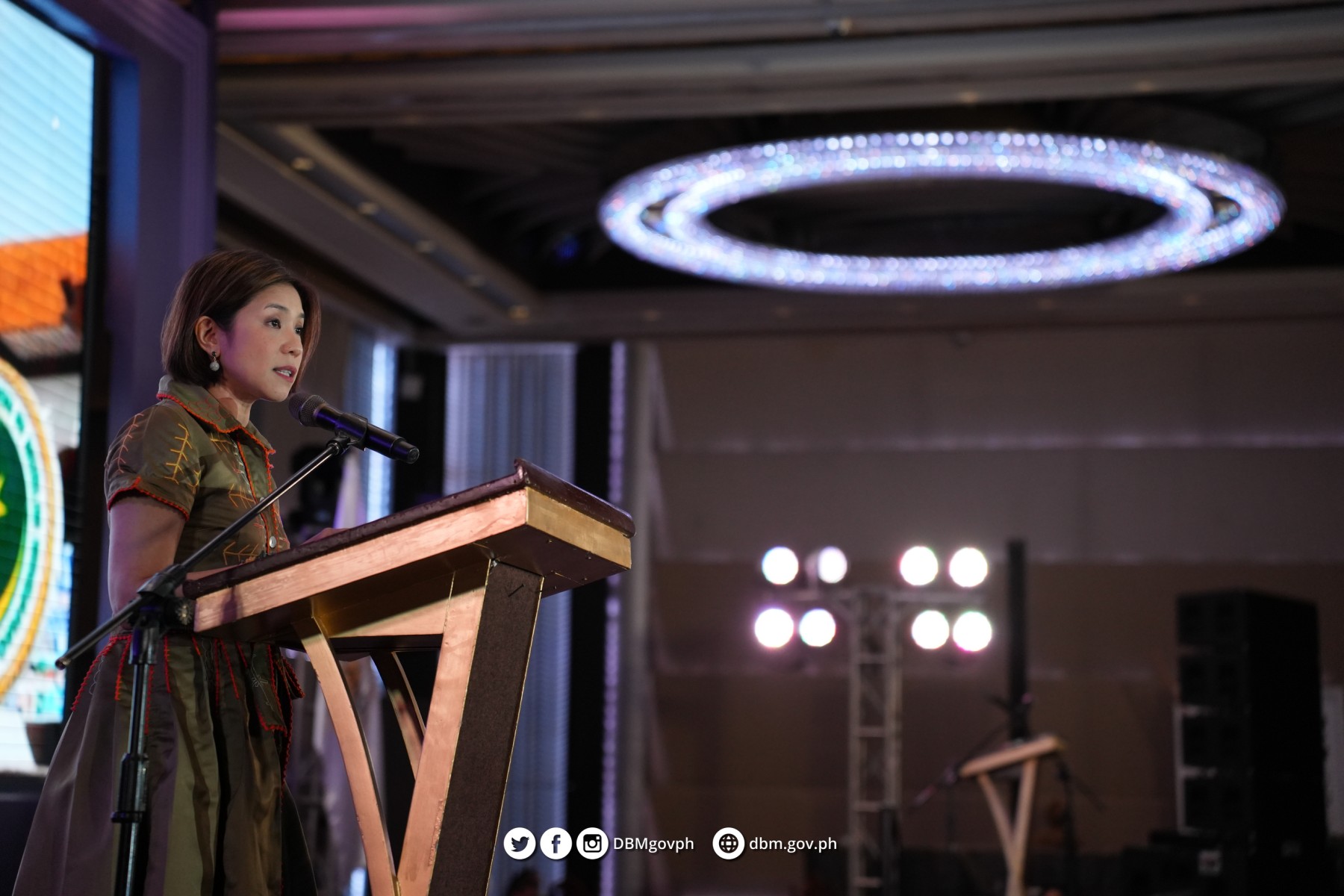
- Details

Mahal na Pangulong Ferdinand R. Marcos Jr.;
Sa mga kasamahan ko sa Gabinete—Finance Secretary Benjamin Diokno, Interior and Local Government Secretary Benjamin Abalos Jr., Environment and Natural Resources Secretary Ma. Antonia Yulo-Loyzaga, at Tourism Secretary Ma. Christina Frasco;
League of Municipalities of the Philippines (LMP) National President and La Paz, Abra Mayor JB Bernos, LMP Executive Director Andrea Loriaga, mga miyembro ng LMP National Executive Committee at National Secretariat;
At sa ating mga butihing kawani ng gobyerno, magandang araw po.
Ikinagagalak kong makita at makausap ang ating mga kasama mula sa ating mga local government units o LGUs, pati na rin ang ating mga katuwang mula sa iba’t ibang munisipalidad. Dito ako nagkakaroon ng pagkakataon na makita at higit na maunawaan ang sitwasyon ng ating mga LGUs na nagsisilbing frontliners natin sa usapan ng public health, climate change, digitalization, at iba pa.
Kaya naman po ang mensahe ko ngayong hapon ay iikot sa konsepto ng empathy—ang pakiki-isa sa ating kapwa tao—or the ability to put oneself in other people’s shoes and see the world from their eyes.
Sa ating pakiki-isa, kasama na rin po rito ang ating pakikiramay, pag-unawa, at pagmamalasakit sa kapwa.
Relating to this event’s theme, “Strengthening Municipal Capabilities Around Autonomy and Fostering Resiliency,” while we easily associate resilience with autonomy, let us remember that, as leaders in government, it is incumbent upon us to lead with empathy.
Embedding empathy in governance translates to policies that truly consider and respond to the needs of our localities.
Empathy enables us to connect with the people and understand their situation which in turn, will enable us to provide them with what they truly need. I believe that is the true essence of public service.
Empathetic governance will empower communities to advocate and work for their evolving collective interests, building strength and resilience. Through this, they can better address the adversities that they face and deliver policies that support public welfare, leading to their aspired autonomy.
With empathy for the needs of our people, the Department of Budget and Management (DBM) prepared a national budget for economic transformation that is truly inclusive and sustainable— budget na tunay na dumaramay, nakaka-unawa, at nagmamalasakit sa mga Pilipino.
These expenditures, which put a premium on strengthening social protection, ensuring food security, and establishing livable communities, among others, also support the Administration’s 8-point Socioeconomic Agenda and will cater to the objectives under the Philippine Development Plan (PDP) 2023 to 2028.
Kasama sa mga istratehiyang nakalatag sa PDP ay ang mas matatag na pagtutulungan sa pagitan ng lokal at pambansang pamahalaan. Sapagkat hindi naman magiging tunay na “inclusive” ang ating kaunlaran kung wala ang ating lokal na pamahalaan.
Under the 2023 national budget, some Php 820.3 billion is automatically appropriated to LGUs as part of their National Tax Allotment. Thirty-four percent of this, equivalent to Php 278.9 billion, is allocated to more than a thousand municipalities.
We have also allotted Php 16.5 billion for the Local Government Support Fund. Under this, Php 9.16 billion is for financial assistance to Local Government Units, Php 1.0 billion for the Growth Equity Fund, and Php 6.34 billion as support to the Barangay Development Program of the National Task Force to End Local Communist Armed Conflict or the NTF-ELCAC.
Recognizing the plight of our brothers and sisters in the Bangsamoro Autonomous Region in Muslim Mindanao (BARMM) as their government undergoes transition, we have appropriated Php 64.76 billion for their Annual Block Grant; Php 5.0 billion as Special Development Fund for the rebuilding, rehabilitation, and development of its conflict-affected communities; and Php 4.59 billion for their share in taxes, fees, and charges collected in the region.
Makaaasa rin po kayo na patuloy na susuporta ang DBM pagdating sa devolution ng functions at services ng ating LGUs alinsunod sa Mandanas-Garcia Supreme Court Ruling.
Kinikilala po natin ang mga limitasyon sa kasalukuyang kapasidad ng ating mga LGUs at nauunawaan po natin ang kanilang mga sentimyento ukol sa implementasyon ng full devolution. Kaya naman ipinanukala po natin kasama ng ating Secretary ng DILG, ng NEDA o National Economic and Development Authority, at ng ating Secretary of Finance na i-extend hanggang 2027 ang devolution ng functions at services ng mga LGUs.
We are also well-aware that the differing levels of technical and financial capacities of LGUs affect their absorptive capacities in implementing such policy. In line with this, we partnered again with the Department of Finance and the Department of the Interior and Local Government to continuously provide capacity building interventions appropriate and responsive to the development needs of our local governments. We are also formulating a long-term development strategy and program for LGUs through the Devolution Transition Plans.
On our end at the DBM, we remain committed to pushing for initiatives at the national level that empathize with our local governments and, in turn, empower them in achieving resilience and autonomy.
Currently, the DBM leads the Philippine Open Government Partnership or the PH-OGP which is committed to energizing civic spaces and public participation, enhancing inclusive digital revolution, amplifying discourses on anti-corruption, and strengthening reforms on transparency and accountability.
Acknowledging the importance of listening to the people in empowering them, we have enabled local government leaders, as well as other members of the civil society, to directly raise their concerns on different key issues to the Philippine government through the Dagyaw Town Hall meetings.
To sustain this platform, we hope to institutionalize the PH-OGP through an Executive Order which is expected to be approved within the first semester of 2023.
In line with the OGP principles, we have also reconstituted the DBM Fiscal Openness Working Group to lead the implementation of strategies and institutionalize fiscal transparency efforts and public participation in the Philippine budget process.
Sinisikap din namin na tunay na maunawaan at matugunan ang mga pangangailangan ng ating mga munisipalidad, hence we also target to roll out the Participatory Budgeting Program which ensures the implementation of priority poverty reduction projects as identified at the city or municipal level through participatory planning and budgeting process.
For Bureaucratic Efficiency—kasama po ‘yan sa ating 8-Point Socioeconomic Agenda—we are continuously pushing for the passage of the Progressive Budgeting for Better and Modernized Governance or the PBBM Governance Bill in Congress which aims to streamline the processes of delivering programs and services across all government offices, including local government units, through digitalization.
This will be complemented by the Department’s Digital Transformation Roadmap which will facilitate faster release of data needed for government transactions to promote fiscal transparency, management, and accountability in the government. This is in line with Executive Order No. 170 signed by then-President Duterte or the Adoption of Digital Payments for Government Disbursements and Collections. Sa pamamagitan po nito, mas mabilis at mas tapat po tayong makapagbibigay ng serbisyo na angkop sa kalagayan ng ating mga mamamayan.
All of these are indications of how we seek to empathize with the needs of our local governments and our people in pursuit of good governance. It is empathy that we need as we implement the whole-of-government approach and ensure that no Filipino is left behind.
Higit pa sa paghahanda ng isang people-centered budget, tunay na nakiki-isa tayo sa ating mga kababayan sa pamamagitan ng pagbibigay sa kanila ng tunay nilang pangangailangan at mga bagay na makapagpapadali sa kanilang buhay.
As we strengthen municipal capabilities and empower our people towards autonomy and resilience, let us lead with empathy.
Ilagay natin ang ating mga sarili sa kinatatayuan ng ating mga pinagsisilbihan upang tunay nating maunawaan ang kanilang mga hinaing.
Through empathy, we will all be moved to work with the best of our abilities for the betterment of our municipalities and our country. Sa tunay na pakiki-isa sa ating mga mamamayan, magiging tunay na tapat ang ating serbisyo sa ating bayan.
Maraming salamat po. Assalamu alaikum.
Mabuhay ang League of Municipalities of the Philippines! Mabuhay ang Pilipinas at mga Pilipino.
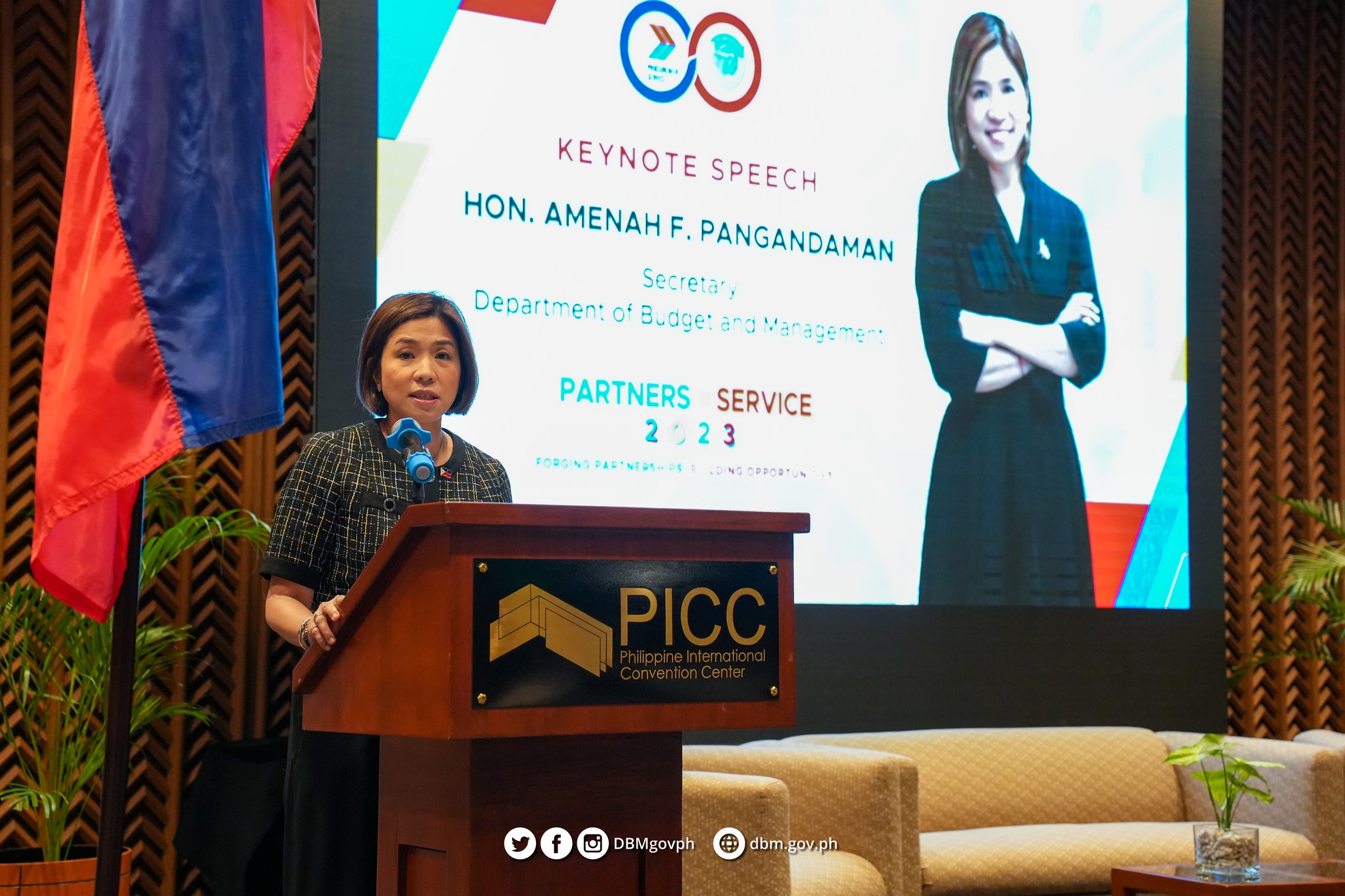
- Details

To the Executive Director of our Procurement Service (PS), Atty. Dennis Santiago, the government and business executives joining us today, ladies and gentlemen, good morning.
First of all, let me congratulate PS-DBM on your efforts to bring accountability and credibility back to this office. It was great news when Atty. Santiago announced that last month, the government generated Php 681 million worth of savings in 2022 as a result of your efforts to ensure a more competitive, transparent, and efficient procurement system.
I am confident that PS-DBM will only get better, especially with our efforts towards digitalization. We have come a long way from the days when procurement was undertaken manually through phone calls, piles of requisition slips, and papers. Nowadays, we have PhilGEPS and government websites where transactions and announcements are made and can easily be monitored. Recently, PhilGEPS also expanded its digital payment options to ensure efficiency among stakeholders. And this is just the beginning.
This year, we are ramping up our efforts for a more efficient, accountable, and even sustainable procurement system. While we are on track with our Agenda for Prosperity—especially in enhancing digitalization in the government—we are also working hard towards mainstreaming sustainability through reforms such as Green Procurement.
The Green Public Procurement Roadmap will direct the government to procure Common-use Supplies and Equipment or CSEs with reduced environmental impact throughout their cycle. In line with this, there has been an increase in the number of government agencies adopting green specifications in non-CSE items, from 26 percent of all government agencies in 2018 to 58 percent in 2020. In November 2022, we also created the Green Public Procurement Committee to ensure that the roadmap will be implemented across the government. Let me just thank Atty. Dennis Santiago because he was the one who formulated the first roadmap for Green Procurement.
Moreover, a manual is being crafted to guide procurement practitioners in embedding green specifications in our Common-use Supplies and Equipment. This will put us closer to our ultimate goal of ensuring sustainable management and use of natural resources by 2030.
Given all these, centralized procurement is still more advantageous to the government and its people. Hence, I will continue to support PS-DBM while advocating for the restructuring of its organizational staffing and the amendment of the Government Procurement Reform Act which is already two decades old.
The law was authored by the late Senate President Edgardo Angara. It is an exemplary law but our society has changed drastically since its enactment, hence the need to update and revise it to reflect as well the latest social and technological developments that we can use to meet the law's noble objectives.
With the updated law, we will have the opportunity to put the right people in, thus ensuring accountability as well as the sustainability of the institution and our procurement system. I am confident that with the excellent leadership of Atty. Santiago, our reforms will be realized and executed with utmost integrity.
As we strive to create an efficient and transparent system—so that the public can hold accountable those who are in position—we seek your help in the sustainability aspect of our efforts as these will define our lives in the coming years and decades and impact our generations to come. We encourage you, our bidders, partners, and suppliers, to join us in ensuring that our economic transformation is not only inclusive, but also sustainable for the coming generations.
I believe that more partnerships can be forged and greater opportunities built as we foster accountability and sustainability in public procurement. With these two, we can look forward to a genuine, all-encompassing prosperity in our public institutions, private businesses, and ultimately, in our country.
As I always say, and echo Senator Angara, let us give every Filipino, including the man on the street with a family to feed, a fighting chance to create a better life for himself and for his family. This can be accomplished if we establish conducive conditions for them to reach their full potential. And this can be achieved through a sustainable and accountable procurement system that will make public service delivery more efficient and effective—one that Filipinos deserve and desire.
Once again, thank you very much for partnering with us.
As PS-DBM works hard to bring back accountability and credibility to the procurement system, let us take it to the next level with digitalization and efforts for sustainability.
Let’s see the best PS-DBM yet—one that would make both the late, great Senate President Edgardo Angara and future generations proud.
Maraming salamat po. Assalamu alaikum.
